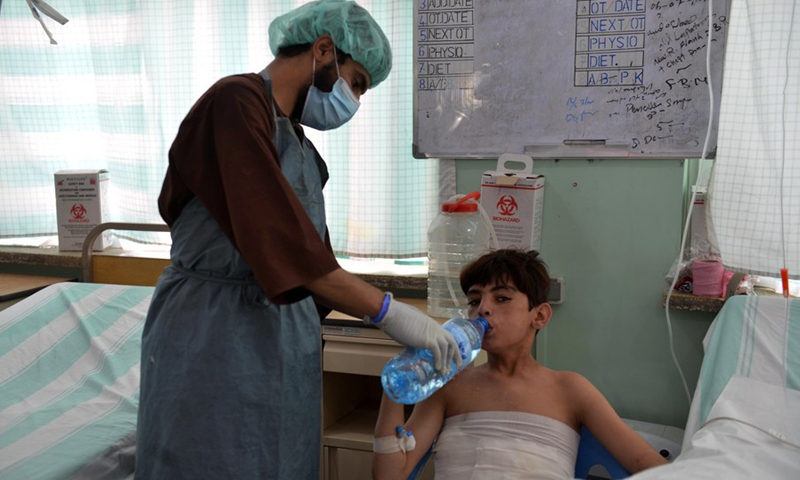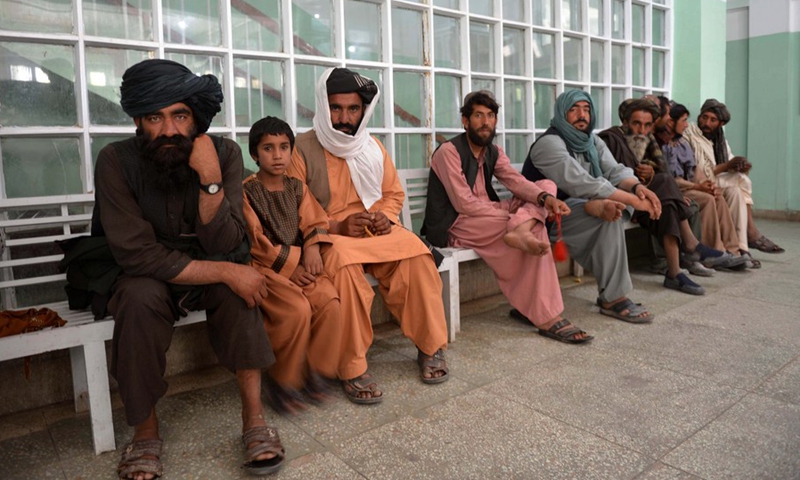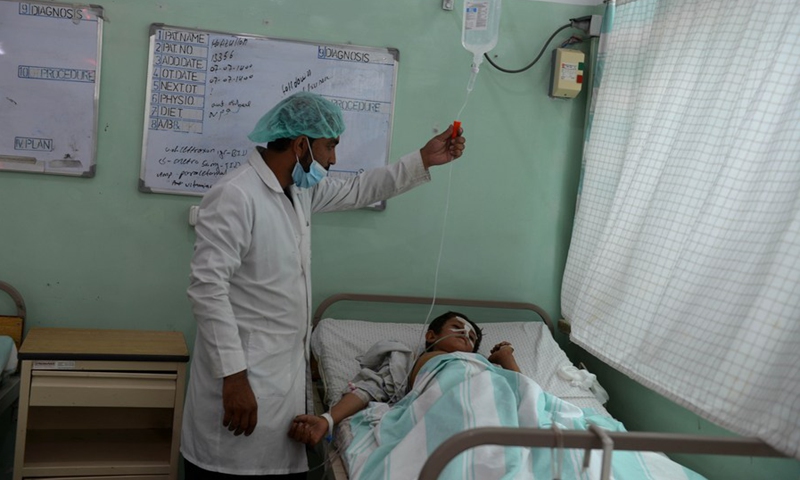
A doctor gives water to a child at the Mirwais Regional Hospital in Kandahar city, southern Afghanistan, Sept. 30, 2021.(Photo: Xinhua)

Relatives of patients wait at the Mirwais Regional Hospital in Kandahar city, southern Afghanistan, Sept. 30, 2021.(Photo: Xinhua)

A child receives treatment at the Mirwais Regional Hospital in Kandahar city, southern Afghanistan, Sept. 30, 2021.(Photo: Xinhua)
In a China-built hospital in southern Afghanistan, patients awaiting treatment deem themselves lucky despite their illnesses as many of their country folks could hardly access any medical facility due to destruction in years of war and lack of resources.
The Mirwais Regional Hospital, built by China more than four decades ago in Kandahar province as a gift for the Afghan people, is named after former Afghan king Mirwais Khan, and is also known as "Chinayano Shafakhana" in the Pashto language, meaning "Chinese Hospital."
The hospital, with departments such as surgery, cardiology, neurology, dermatology, gynaecology and obstetrics, as well as pediatrics, has become a major health center in the country's southern region, and receives patients from across Kandahar and neighboring provinces.
Local resident Mohammad Ayoub took his son to the hospital after the latter got wounded in a landmine explosion.
"I came from Uruzgan province. There are hospitals in Uruzgan, but they have no equipment and there is a shortage of critical medical supplies. After my son was wounded, villagers asked me to take him to Chinayano Shafakhana in Kandahar, and they said it is a well-equipped facility," Ayoub told Xinhua on Thursday.
"Thanks to China for building this hospital decades ago. Today this facility provides service to patients and their attendants. This hospital has good doctors and nurses; they are professional and kind," he said.
"I'm from Garmser district in Helmand province. Our village is located in a desert. We have no equipped health clinic in Garmser. I took my son who was suffering from burn injuries (here). He is recovering in this hospital now," Mohammad Wali, a Garmser villager, told Xinhua.
"This hospital, which receives hundreds of patients and war-injured, is very famous. It has kindhearted personnel; this is the only advanced hospital in this region. We are satisfied with the hospital service here," Wali said.
"The Mirwais Regional Hospital had 350 beds when it opened, but the facility has expanded during the past years. Now, it has 620 beds," Dr. Mohammad Qasim told Xinhua, noting the hospital had admitted about 30,000 patients, including around 7,000 inpatients, on a monthly average basis before the U.S. withdrawal from the country.
Following the Taliban takeover, the number of admissions to the hospital soared to approximately 60,000 in one month, including about 10,000 inpatients, said Qasim, physician-in-chief of the hospital.
"Now the country is calm, and there is no fighting and war, so people can move freely and take their patients from villages and far-flung areas to provincial capitals," he said.
The facility has also treated hundreds of COVID-19 patients since the coronavirus was detected in Afghanistan in February 2020, Qasim said.
However, though the situation in Afghanistan has remained stable since mid-August, the country is still suffering economic hardship and a humanitarian crisis. But what made things worse is an international aid freeze, which could shutter a majority of Afghanistan's public health facilities.
On Wednesday, the World Health Organization warned of the deteriorating health situation in Afghanistan, considering that "access to health care is decreasing."
According to the organization, only 17 percent of the over 2,300 health facilities previously supported by the World Bank are fully functional. "Two thirds of these health facilities have run out of essential medicines. WHO is working with donors to sustain these health facilities to prevent a surge in deaths."
The increase in people seeking treatment has put local hospitals, including the Chinese hospital, under even greater strain.
"The number of the war-injured has dropped nearly to zero," Qasim said. "But our hospital is overburdened to the point that the number of patients has doubled amid a severe shortage of capabilities and supplies in some local hospitals in neighboring provinces."
"We are in fear that our hospital may face a shortage of essential health necessities and life-saving medical items," he said.
A silver lining at this challenging moment was the timely arrival of medical supplies donated by China.
On Wednesday night, a batch of emergency supplies from China arrived at Afghanistan's Kabul International Airport. At the handover ceremony, Chinese Ambassador to Afghanistan Wang Yu said China will continue to prepare other aid, including food, which is expected to arrive before long.
